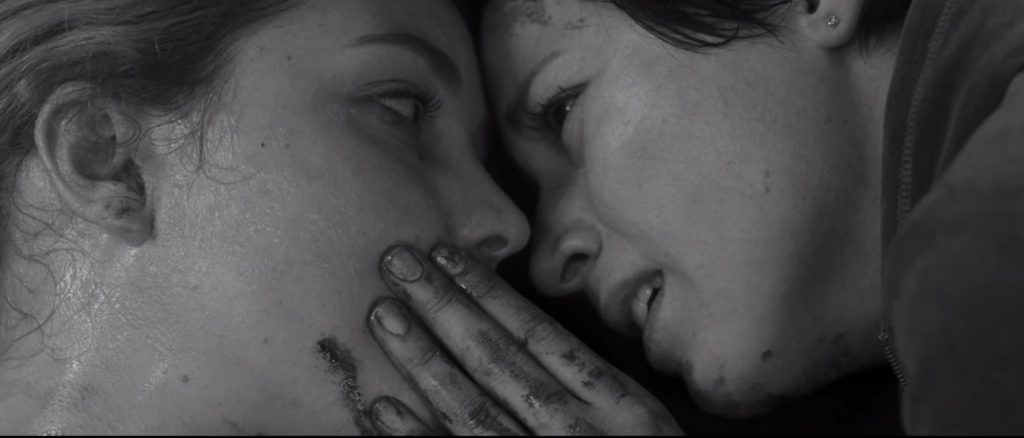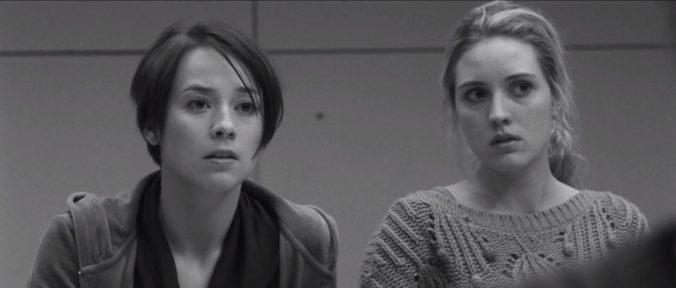For each movie in the “Denis 2049” series, Taylor and Sam will sit down and bounce some thoughts off each other, off-mic. Their brilliant minds will unleash many words. Make of them what you will. This time: “Polytechnique.”
Taylor: It’s not often that I have to actually put my hand over my heart to make sure it’s still beating. Typically, it’s something I trust is happening by the simple fact that I’m still walking around. When it comes to movies, I typically don’t have big reactions, either. It’s more of an “ooh, ahh” type of excitement when something tense is happening than any kind of physical reaction. I’d call it an … intellectual reaction, I guess.
In “Polytechnique,” though, I felt physically sick. I was straight-up terrified watching this movie. And I’m not saying that to try to reduce this movie to some kind of cheap thriller or horror movie. This movie is horrifying because of a realistic, eyes-wide-open portrayal of what it looks like when pure evil intrudes onto normal life.
As we discussed at length on the podcast, “Polytechnique” tells the story of a 1989 school shooting that took place on a college campus in Montreal. And as Villeneuve’s camera watched the killer wander the halls of the school, a sensation came over me that is hard to describe. I felt like I was witnessing something impossible, the act of witnessing it ensuring that I couldn’t deny what was happening right in front of me. A contradiction that I can’t justify but won’t back down from. It was surreal. I don’t think I’ve ever been so compelled and disturbed and haunted by a movie all at once.
Sam: “Polytechnique” is one of those movies – “Schindler’s List,” “Manchester by the Sea,” Villeneuve’s own “Prisoners” – that gladly asks you to pay money to get punched in the throat. It hurts to watch this movie. It’s gut-wrenching and brutal and the longest 80-minute movie I’ve ever seen.
I loved it.
It never tries to be theatrical or jumpy for the sake of fear. Villeneuve puts this story out in the cold light of day, and by mere exposure to the action, we feel every gun shot. That’s more frightening than anything. It takes something dark and unthinkable and puts it in the midst of complete normalcy – the exact place that tragedy really happens.
Taylor: I want to go on an insane tangent or make a dumb joke or change the subject randomly as I’m wont to do in these Fireside Chats, but this movie feels too serious and important to do that.
Keep talking smart about it.
Sam: Okay, try this.
The weird thing about “Polytechnique” is that, when you place someone so heinous among the everyday, he blends in. One of the most deeply affecting sequences is the intercutting series of shots between the killer and the protagonist, Valérie, as they get ready for their day in the morning. Before shots are fired, they’re both leading plain, indistinguishable lives. They’re both messy, somewhat alone, and essentially “normal.” The interwoven scenes have a two-sided effect where you feel like, “Wow, a killer could come from anywhere and be anyone,” but also, “Even the most terrible people are still just … people.”
Villeneuve could have easily made the killer a faceless, pitiless evil, but he chose to make things more complicated. He showed someone who was purely sexist and hellbent on exterminating women, and then had him write an apology letter to his mother.
You also see the suffering and stain on the survivors’ lives caused by the killer’s actions. Things are hard for them. Dillenuve is able to show the full width and breadth of a tragedy like this – the way it expands beyond just those on campus that day and affects life writ large – by zooming in with a microscope. He took a huge event that affected many people and focused in on three characters. In doing so, he was able to make something completely universal.

Denis was perfect for this movie. He told the story in a way that shocked and hurt, but it did so with total respect and integrity. It’s one of the best movies I’ll never watch again.
Taylor: Ooh, here’s a tangent. This is a list of eight movies I’ll never watch again (except when I have to for the Denis 2049 series…)
1. “Polytechnique”
Asked and answered.
2. “12 Years A Slave”
This movie is about being a slave for 12 years. I think that’s pretty self-explanatory.
3. “Prisoners”
“Hey, honey, let’s watch this movie that makes us feel what it would be like if our kids were kidnapped by a stranger and we never saw them again. I’ll make some popcorn!”
4. “Boyhood”
This is a feat of filmmaking, but it’s pretty boring in retrospect. I’m glad I saw it because it feels important, but I would like to never see it again.
5. “Lone Survivor”
Too intense.
6. “Foxcatcher”
Too creepy.
7. “Manchester By The Sea”
If you’ve seen this movie, I don’t need to explain myself.
8. “Man of Steel”
This movie is actually terrible, I just want people to know I will leave their home if this movie is ever put in front of my eyes ever again.
Sam: Great list. A-plus. But I would add the movie “Shop Girl.” Saw it on a cruise when I was 11 and got really excited because Steve Martin was in it, but it bored me off the ship.
Taylor: Damn, you probably missed out on a great cruise because of that.
All that being said, “Polytechnique” is easily the best movie we’ve watched so far in this series.
Sam: Easily the best.
The Denis rankings after three movies:
- “Polytechnique”
(gap to show how much better I think it is.)
- “August 32nd on Earth”
- “Maelstrom”
Next up: “Incendies.”
